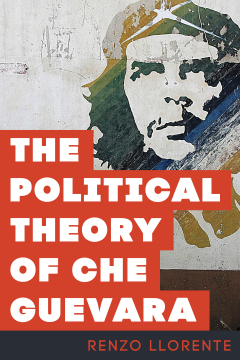
Additional Information
Book Details
Abstract
Nearly half a century after his death, Ernesto “Che” Guevara remains a compelling and controversial figure. He was an original social theorist, and many of his writings attest to an innovative interpretation of various concepts and commitments central to Marxist thought. This is one of the first works to comprehensively consider his contribution to social and political theory for a student audience.
Firstly, the book provides thorough and reliable accounts of the key theses, concepts and commitments that give Che Guevara’s theoretical, and political, orientation its distinctive character. It addresses Guevara’s views on topics such as work, morality in socialism, egalitarianism, prefigurative politics, internationalism, and the process of “disembourgeoisement”. Secondly, the study situates Guevara’s ideas within the context of the Marxist theoretical tradition and, on the other hand, twentieth-century Latin American social thought. To this end, it will explore both the affinities and dissimilarities between Guevara's views on certain fundamental questions and the views represented by such figures as Marx, Lenin, Herbert Marcuse and José Carlos Mariátegui. Finally, The Political Thought of Che Guevara will provide critical assessments of Che’s key ideas, many of which remain relevant to contemporary debates in socialist theory.
This is an important reading of Che's life and work and a major contribution to our understanding of Che's political theory. Further, it is. indispensable for all those open to the possibility of "being like Che" arriving as it does at a time when "being like Che" carries with it a special political and moral urgency.
Peter McLaren, Distinguished Professor in Critical Studies, Chapman University
This remarkable essay is a reliable and insightful guide to Guevara's thought and to his legacy for the Socialism of the 21st Century. One can easily conclude from this analysis of Guevara's Marxist Humanism and revolutionary ethics, how little he had to do with Stalinism, and how much he had in common with the Latin American Marxist tradition initiated by José Carlos Mariategui.
Michael Löwy
Renzo Llorente’s The Political Theory of Che Guevara is an outstanding work of explanatory synthesis. Though far from the first attempt at a concise outline of Guevara’s thought, it stands out for the care Llorente takes in guiding his reader through complex and potentially forbidding material. A professor of social and political philosophy at the Madrid campus of Saint Louis University, he proves himself a skillful teacher on the page. His prose is remarkably clean, accessible and free of jargon. He patiently explains concepts upon introducing them and provides relevant historical or theoretical information when necessary, though not so much as to overwhelm the reader. Instructors looking to introduce high school and college students to the ideas of one of the 20th century’s most fascinating minds will be hard pressed to find a better textbook.
Llorente’s book provides a fascinating examination of Guevara’s political ideas on revolution, anti-imperialism, socialist construction, consciousness and social-relations. The author frames Guevara in relation to radical social theory. Llorente has extensive knowledge of Guevara’s writings and speeches and explores these drawing out connections with the work of Marx, Lenin, Trotsky, Lukacs, and others who have contributed to Marxist theory and socialist praxis.
Helen Yaffe, Economic History Fellow, London School of Economics
Renzo Llorente teaches Philosophy at Saint Louis University, Madrid Campus. He is the translator and editor of The Marxism of Manuel Sacristán: From Communism to the New Social Movements (2014) and the author of Beyond the Pale: Exercises in Provocation (2010).
Table of Contents
| Section Title | Page | Action | Price |
|---|---|---|---|
| Contents | v | ||
| Acknowledgments | vii | ||
| Timeline | ix | ||
| Introduction | 1 | ||
| Chapter 1. The New Human Being | 9 | ||
| Chapter 2. The Problem of Work | 29 | ||
| Chapter 3. Internationalism and Anti-imperialism | 45 | ||
| Chapter 4. Socialism, Communism, and Revolution | 61 | ||
| Chapter 5. Consolidating the Revolution and the Building of Socialism | 81 | ||
| Chapter 6. The Guevarist Legacy | 105 | ||
| Notes | 125 | ||
| Bibliography | 167 | ||
| Index | 177 | ||
| About the Author | 183 |
